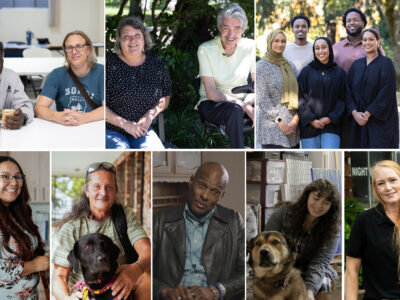Homeless Mobile Intake Team
'Our clients who were houseless on the street... are now in apartments.'
Supportive Housing Services-funded Homeless Mobile Intake Team helps people experiencing homelessness connect to existing resources, focusing on those who are aging and/or have disabilities.
Jeffrey Stevens’ life took a turn a couple years ago when his roommate passed away. The 73-year-old musician, who’d had a long career in public access television, lost financial support, stability and his home. “That’s when the support system fell apart,” said Stevens. Stevens, who also has a disabling condition, was staying at a shelter funded by the Joint Office of Homeless Services when a caseworker referred him to the County’s Homeless Mobile Intake Team.
Background on the team
The team is part of Multnomah County’s Department of County Human Services’ Aging, Disability, and Veterans Services Division, and it’s funded by the Supportive Housing Services Measure, The team works in partnership with the Joint Office and helps people experiencing homelessness connect to existing resources, focusing on those who are aging and/or have disabilities.
The five-person team was launched in 2022, and has since served 295 participants.
Video: Homeless Mobile Intake Team
Services meet clients where they are
Before the Homeless Mobile Intake Team existed, connections to those resources relied on phone calls and subsequent office visits. But now, those services can be brought directly to clients where they are — rather than requiring them to travel first to a government office. “We bring Aging and Disabilities out to the streets, out literally to the people,” said case manager Caitlin Lee.
Lee met with Stevens at his downtown shelter and conducted an assessment to determine his medical eligibility. Lee got Stevens approved for Medicaid and is guiding him toward housing. “I get to stay with you,” said Lee. “We develop a relationship. And I walk you and guide you out of homelessness.”
The mobile team conducts assessments, identifies benefits, and provides short-term intensive housing case management. The team also connects people to long-term housing vouchers through the Regional Long-Term Rent Assistance program. Case managers also connect with service partners to help cover move-in costs and provide supportive services.
“We have 15 of our clients who were houseless on the street, who are now in apartments,” said Lee.
For Stevens, the mobile intake team has been a game-changer. “They [case managers] have to believe in what they’re doing,” Stevens said, “because you’re taking care of people, and people are pretty fragile, especially as they get older. “It’s hard enough to be homeless. But being involved, staying busy, and addressing the problem on the front lines was a lifesaver for me.”





